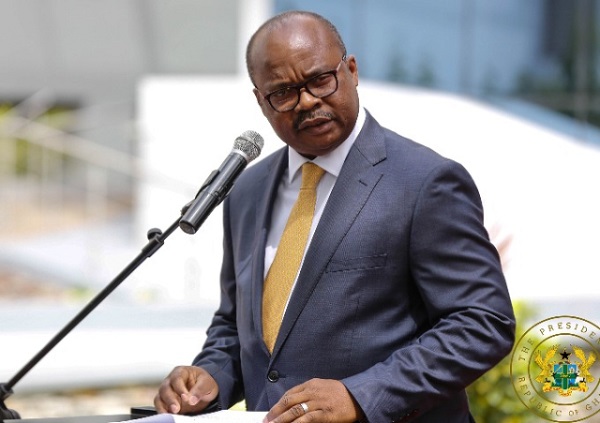The central bank stands ready to safeguard the financial sector with plans to provide exclusive liquidity arrangements to banks, aside from the Ghana Financial Stability Fund (GFSF), that may be affected by the Domestic Debt Exchange Programme (DDEP), Bank of Ghana Governor, Dr. Ernest Addison, has assured.
The Bank’s intervention, along the with the GFSF, will mitigate potential risks to the banking sector resulting from banks’ participation in the proposed DDEP – with the industry’s umbrella-body, Ghana Association of Banks (GAB), having agreed to participate in the Programme.
Currently, government with collaboration from development partners is aiming to raise at least US$1billion: which will be limited to institutions that participate fully in the debt exchange. Already, the World Bank has pledged about US$250million of the targetted amount.
Aside from the GFSF, all the financial sector regulators will deploy regulatory and supervisory tools that mitigate risks to financial stability on the back of the DDEP.
Responding to a question at a press briefing following the 110th Monetary Policy Committee (MPC) meeting, the Governor said: “The GFSF is to be supported by the donor partners and is already capitalised at US$1billion – with the World Bank pledging to support it with about US$250million. At the Bank of Ghana, we have our own liquidity arrangements already with the banks and do not plan to be part of the Ghana Financial Stability Fund, which is mainly financed by external development partners”.
He assured that banks are fairly capitalised, some of which hold capital in excess of the regulator requirement; however, those impacted by the DDEP will be given enough time to recapitalise.
There are emerging signs that current macroeconomic conditions are spilling over to the banking sector. Profitability levels have declined alongside other financial soundness indicators. The central bank’s latest macro-prudential risk assessments indicated increased pressure on solvency and liquidity of banks ahead of the DDEP implementation.
The industry’s Capital Adequacy Ratio (CAR) declined to 16.6 percent, but remained above the prudential minimum of 13 percent as at December 2022 from 19.6 percent in December 2021 – attributed to losses on mark-to-market investments, increase in risk-weighted assets of banks from the high growth in actual credit, and the price effect of Ghana cedi-depreciation on foreign currency-denominated loans.
The sector’s profitability indicators – namely the return-on-equity and return-on-assets – also declined during the period, in line with declining profit after tax and profit-before-tax respectively. The non-performing loans (NPL) ratio however improved to 14.8 percent in December 2022 compared with 15.2 percent in December 2021, on account of high credit growth relative to the increased stock of NPLs between the two periods.
Dr. Addison noted that to moderate any potential impact on the sector, the Bank has some regulatory reliefs for banks to help preserve financial stability.
“We don’t think that the forbearance measures in place will compromise the financial sector’s stability. Our banks are fairly well capitalised; as you know, most of them were holding capital in excess of the requirement. And we think those which fall slightly below the requirement will be given enough time to recapitalise; that should not compromise the integrity [of the financial sector].
“Besides that, there are backstops; both the GFSF and central bank will be there to support the system. So, I do not see any issues in terms of compromising the financial sector’s integrity,” the Governor said.
Total banking sector assets increased to GH¢221billion, representing an annual growth of 22.9 percent in December 2022 compared to growth of 20.4 percent a year earlier. Total deposits ended the year at GH¢157.9billion, representing an increase of 30.4 percent in 2022 relative to growth of 16.6 percent in 2021.
Credit continued to increase, recording growth of 30.2 percent to GH¢70.0billion from GH¢53.8billion in December 2021. Total investments, on the other hand, contracted by 4.8 percent to GH¢79.2billion in December 2022 relative to 29.0 percent annual growth in 2021, as banks rebalanced asset portfolios in response to the Domestic Debt Exchange Programme.







![[VIDEO] Agya Koo celebrates like Cristiano Ronaldo after scoring penalty](https://ghananewss.com/storage/2023/02/BeFunky-collage-2023-02-17T164545.706-scaled-100x75.jpg)










